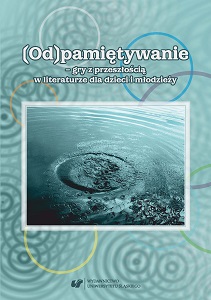Kobieca opowieść o Zagładzie na przykładzie genologii kobiet w Rutce Joanny Fabickiej
A woman story about Holocaust on the exemple of the genology of women in Rutka by Joanna Fabicka
Author(s): Katarzyna Slany
Subject(s): Language and Literature Studies
Published by: Wydawnictwo Uniwersytetu Śląskiego
Keywords: Holocaust; feminism; postmemory; herstory;feminist gene studies;
Summary/Abstract: The article broadly tackles the topic of post-Holocaust children’s literature and the issues of memory and post-memory. These motifs have become popular in the recent years, both in the international and Polish literature addressed to non-adults. The novel Rutka by Joanna Fabicka constitutes the source material of this article and serves as an exemplification of the post-traumatic trend in children’s literature. The book won the main award in the “Book of the Year” competition of the Polish IBBY Section in 2016. An interpretation of the novel that I propose is inspired by feminist studies on the experiences of women during Shoah. This research strand, which has been developed since the 1970s, emphasizes the tremendous role of women’s narratives. These studies hone in on presenting the specifically female experiences, which remained on the margins of the Holocaust narratives dominated by the male-centric narrations deemed as normative. In my study, I employ herstory theory as an analytical approach. In other words, the arguments pertain to the women’s micro-stories and revolve around reconstructing the feminist genres, sisterhood bonds, as well as bringing an individual, intimate and subjective female narrative self into the fore. In ‘Rutka’, the central female character is Róża, who is the main character’s aunt. Her personality can be seen through the lens of a woman with a feminist power. Her post-memory story plays a role of the heritage and will, being normally transferred from the oldest to the youngest woman in the family in the spirit of constructing or maintaining the female genre.
Book: (Od)pamiętywanie – gry z przeszłością w literaturze dla dzieci i młodzieży
- Page Range: 213-225
- Page Count: 13
- Publication Year: 2018
- Language: Polish
- Content File-PDF

